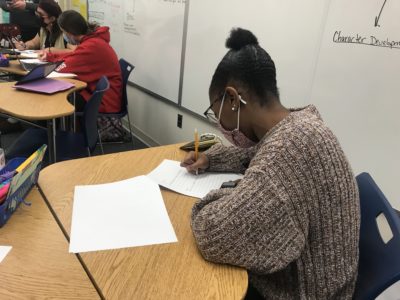

|
|
North Carolina schools are working to build a more solid pipeline of teachers. From calling for more financial incentives to training people making career changes, several methods are being used and shared across counties. Institutions that are collaborating on innovate solutions gave their input on recruiting and retaining a diverse educator workforce in a new report from the Public School Forum of North Carolina.
The Educator Pipeline Collaborative is a cohort of teacher preparation partnerships between universities, community colleges, and local school districts. The goal of the collaborative is to not only strengthen the quality of teaching candidates, but to propose recommendations for policy and practice across programs.
Through the collaborative, the Public School Forum found that local partnerships, such as grow-your-own programs, can help rebuild teacher pipelines.
Grow-your-own programs are collaborations often between school districts, colleges, and universities to encourage students to come back to the school district to teach after earning their degree. They are becoming increasingly popular in North Carolina, with the report highlighting one example in Caldwell County.
Candidates who earn an associates degree through Caldwell Community College & Technical Institute are guaranteed admission to Appalachian State University’s School of Education. Caldwell County Schools then offers guaranteed interviews for open positions in the district for program completers, with the expectation that graduates will work in Caldwell County Schools for at least two years.
“As we share in the report, teacher preparation partnerships across NC are doing incredible work to help rebuild the educator pipeline in our state. At the same time, partners engaged in the Educator Pipeline Collaborative made clear that long-term improvements will also require systemic changes to policy and practice,” Lauren Fox, Public School Forum senior director of policy and research, said in a statement. “…We encourage state and local leaders to take meaningful action — the futures of our students and schools depend on it.”
A look at the teacher pipeline
Challenges with teacher recruitment include teacher wages and diversity. According to the report, over half of the students in the state are people of color, yet over 80% of teachers are white.
In addition, according to the report, North Carolina also ranks 36th nationwide in overall teacher pay and 46th in beginning teacher pay, and the state’s teachers have less valuable benefits compared to other states.
Enrollment in traditional educator prep programs has declined over time, and there are not enough candidates to meet the needs of schools across the state. The last spike was during the 2020-21 school year, where waivers were given out for licensure testing requirements due to the pandemic.
At the same time, according to the report, enrollment in alternative educator programs has increased. While this has “helped to address some of the teacher shortage challenges,” the report found, “this also poses new challenges because teachers entering through alternative pathways often need more professional development and mentoring support in their early years of teaching.


Policy recommendations
Based on the success of the educator prep program partnerships, the forum has come up with five policy recommendations that could be implemented immediately with little to no cost:
- Eliminate the Praxis Core requirement for entry into N.C. Educator Preparation Programs.
- Create licensure reciprocity processes with other states, with an immediate focus on spouses of military personnel.
- Remove the six-month waiting period for retirees before they are allowed to return to public positions.
- Adopt Florida’s Deferred Retirement Option Program to provide an incentive for educators to stay in the field for 35 years instead of 30 years.
- Provide opportunities for educators to be a part of legislation and policy development.
Most of the recommendations require action at the state level. Once action is taken, school districts, community colleges, and universities can implement changes at a fast pace, the report said.
Practical solutions
The report also highlights practices and tools that programs can use in their work that can improve retention in the pipeline. These range from utilizing other staff or volunteers to relieve the school workload, and finding other ways to make sure teacher well-being is a priority:
- Fully fund mentor support for beginning teachers in their first three years.
- Provide opportunities for beginning teachers to gradually take on responsibilities over the first year rather than having a full workload on day one.
- Provide ongoing, timely professional development within the work hours.
- Provide additional time to educators for planning and assessment.
- Fund mentor and coaching support for administrators.
- Provide opportunities for educators to be a part of legislation and policy development and implementation through the creation of advisory groups on major legislation and policy or program development or changes at the state and local levels, respectively.
- Improve working conditions and work-life quality by improving the professionalism of educators.
- Providing flexibility where possible, and ensuring that teachers’ well-being is a priority.
“As we go forward, we must prioritize this type of partnership at the local and state levels. This includes state-level support for recruiting candidates and providing guidance and resources for going through the development process to become teachers,” the report said.





